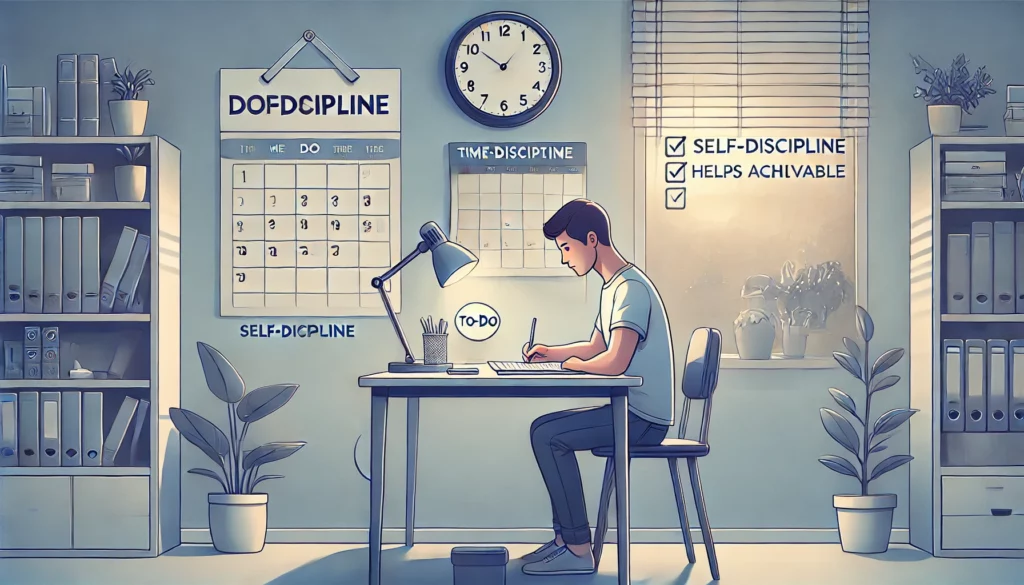Procrastination is one of the most common and destructive habits that prevent people from achieving their goals. Whether it’s avoiding difficult tasks, endlessly planning without execution, or giving in to distractions, procrastination slows progress and creates unnecessary stress and guilt.
The truth is: motivation comes and goes. If you rely solely on how you feel, you’ll never work consistently. What you really need is self-discipline—the ability to act even when you don’t feel like it.
In this article, we’ll explore how self-discipline helps you overcome procrastination, why it’s more dependable than motivation, and how to build disciplined habits that help you take control of your time and productivity.
Why Self-Discipline Is More Powerful Than Motivation
Motivation is emotional. It can be triggered by inspiration, excitement, or urgency—but it’s unreliable. Self-discipline, on the other hand, is a skill you build. It’s your ability to follow through on what matters, regardless of how you feel in the moment.
Here’s how self-discipline directly counters procrastination:
| Procrastination Habit | Self-Discipline Habit |
|---|---|
| Waits to feel motivated | Acts regardless of mood |
| Starts late, finishes under pressure | Starts early and works consistently |
| Gets distracted easily | Eliminates distractions ahead of time |
| Avoids complex or unpleasant tasks | Tackles priority tasks first |
| Overwhelmed by big goals | Breaks goals into daily steps |
Self-discipline gives you structure and resilience. Instead of reacting to distractions or stress, you develop control over your actions. It becomes easier to start, stay focused, and finish what you set out to do.
Understanding the Brain: Why We Procrastinate
Procrastination isn’t just about laziness—it’s a neurological battle between two parts of your brain:
- Prefrontal Cortex – Responsible for planning, decision-making, and long-term thinking.
- Limbic System – Seeks instant gratification and short-term pleasure.
When you feel tempted to scroll through your phone instead of working, it’s your limbic system winning. Self-discipline is what allows your prefrontal cortex to take charge and help you stick to your goals.
Example:
You’re about to start studying for a test, but you feel bored. Your limbic system suggests, “Just check Instagram for a minute.” Without discipline, that “minute” becomes an hour.
But if you’ve trained self-discipline, you’ll override the urge and start the task anyway—because you’ve made doing the hard thing your default behavior.
How to Strengthen Self-Discipline to Beat Procrastination
1. Set Clear, Specific Goals
Vague goals are breeding grounds for procrastination. When your goals are unclear, your brain delays action because it doesn’t know where to start.
Turn vague intentions into specific actions:
| Vague Goal | Clear, Disciplined Goal |
|---|---|
| “I want to read more” | “I’ll read 10 pages every night at 9 PM” |
| “I need to study” | “I’ll review chapter 3 from 6 PM to 6:30 PM” |
| “I want to get fit” | “I’ll do a 20-minute workout every morning at 7” |
The more specific your goal, the easier it is to follow through. You remove the mental friction and make action automatic.
2. Start with the Two-Minute Rule
Big tasks create resistance. Your brain sees them as overwhelming and puts them off. The solution? Make them so small there’s no excuse not to begin.
The Two-Minute Rule says: If something takes less than two minutes, do it now. If it’s bigger, start with just two minutes of effort.
Examples:
- Want to write? Start by writing one sentence.
- Need to clean? Start by picking up one item.
- Want to work out? Start by putting on your sneakers.
Once you begin, momentum takes over. Starting is often all you need.
3. Create a Distraction-Free Environment
Even with strong discipline, your environment can work against you. Notifications, noise, clutter—all of it weakens your focus.
Strategies to eliminate distractions:
| Distraction Type | Solution |
|---|---|
| Phone notifications | Put your phone in another room or use focus mode |
| Social media | Use blockers like Freedom or Cold Turkey |
| Email interruptions | Check email only at set times (e.g., 11 AM and 4 PM) |
| Noise or chaos | Use headphones with ambient music or white noise |
Discipline becomes easier when distractions are out of reach. You’re not relying on willpower—you’re designing an environment that supports focus.
4. Build a Daily Routine That Reinforces Action
A strong routine makes action habitual. When you do the same productive tasks at the same time every day, they become automatic.
Sample productivity routine:
| Time | Activity |
|---|---|
| 6:30 AM | Wake up and stretch |
| 7:00 AM | 20-minute workout |
| 8:00 AM | Plan top three priorities for the day |
| 9:00 AM | Deep work session (writing/studying) |
| 12:00 PM | Lunch and light movement |
| 3:00 PM | Second focus block (emails/tasks) |
| 5:30 PM | Wind down, reflection or journaling |
Discipline is easier when your schedule is predictable. You reduce decision fatigue and remove the opportunity to procrastinate.
5. Use Accountability to Stay Consistent
Discipline gets stronger when someone else knows what you’re working on. Accountability builds commitment—because now you’re not just showing up for yourself.
Ways to stay accountable:
- Tell a friend or mentor your goal and set a deadline.
- Join a group with shared objectives (study group, writing circle, fitness challenge).
- Use apps that track your progress and habits.
Example: If you’re trying to write a book, tell someone you’ll send them 1,000 words by Friday. That simple promise can drive action all week.
6. Track Your Habits and Reward Progress
Seeing your consistency builds motivation. It’s proof that you’re showing up—even on the days you don’t feel like it.
Tools to help:
- Use a habit tracker app like Habitica, Loop Habit Tracker, or even a calendar with daily checkmarks.
- Create a visual chart to track streaks.
- Set rewards for key milestones.
| Task Completed | Small Reward |
|---|---|
| Wrote 500 words today | Enjoy a specialty coffee |
| Exercised 3 days in a row | Watch a favorite movie |
| Avoided social media all morning | Take a longer afternoon break |
Discipline is not punishment. When you reward effort, it becomes something you want to maintain—not something you dread.
Final Thought: Discipline Is the Path to Freedom
Self-discipline isn’t about being strict or robotic—it’s about choosing what matters most, even when it’s hard. It’s about building habits that carry you through low-motivation days and protect your time, energy, and goals.
When you build discipline, you:
- Take consistent action—even when it’s uncomfortable
- Replace procrastination with momentum
- Get more done in less time
- Feel more in control of your day and your life
Start small. Pick one strategy from this article and apply it today. Don’t wait to feel ready. The action you take now will strengthen your discipline for tomorrow.
Gabriel Silva is the founder of Cursos e Soluções, a blog dedicated to personal growth, habit change, and self-discipline. Passionate about self-development and productivity, he shares practical, research-backed strategies to help people achieve their goals. He believes that small, consistent changes can lead to significant transformations over time and is committed to providing content that empowers both personal and professional success.







